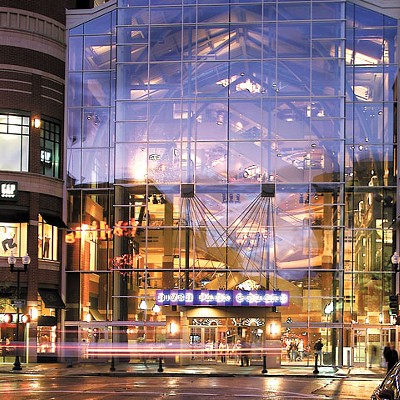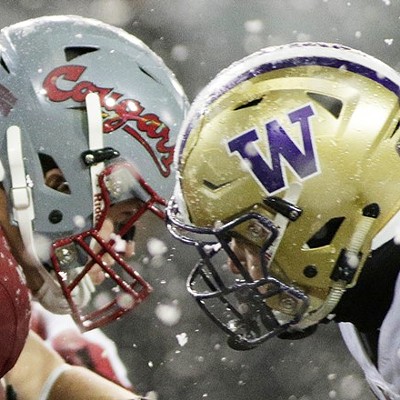In the calculus determining the success or failure of the River Park Square redevelopment project, the stakes have always been higher than just the mall for the Cowles family. After all, their most prized possession, the Spokesman-Review, became a part of the picture early in the process. Their coverage of the issue when it mattered most -- between mid-1996 and early 1997 -- was soft, leading to a loss of credibility with at least some readers. When the deal needed scrutiny from a watchdog, it got a cheerleader, from the Editorial page at least. Later, after the city joined the project, the Review published some in-depth coverage, but by then the troubled deal was done.
Concerns that the newspaper's watchdog function was sublimated to its owners' real estate plans are likely to be revived in the wake of Betsy Cowles' deposition in the federal case surrounding the mall's failing garage. In an exchange early on the first day of her depo, Cowles admitted to seeing Spokesman-Review stories related to the mall project before they went into print, and that she often corrected factual errors. Here is the full transcript of that exchange.
Gary Ceriani: Did anyone affiliated in any way with the Spokesman-Review ever submit to you drafts of any articles or editorials relating to the mall prior to their publication?
Betsy Cowles: Did anyone submit drafts -- I reviewed, I had reviewed articles, yes.
GC: Prior to their publication?
BC: Yes.
GC: Have you reviewed editorials prior to their publication?
BC: No.
GC: All right. When you have, when drafts of articles were submitted to you, what was your understanding with respect to why they were being submitted to you?
BC: The newspaper had a longstanding rule which we referred to as the "no surprises" rule, which meant anytime the newspaper would write something about a family member or a company business, a family-owned business, that the publisher would get a heads-up and at some time see the story before it was in print.
I was asked occasionally to look at stories after they came through the publisher's office for basic facts relating to or accuracy of quotes of my own.
GC: Who was the publisher during this period of time?
BC: Stacey Cowles.
GC: And he is your brother?
BC: Yes.
GC: So as I understand it the no-surprise rule meant that insofar as we are talking about River Park Square any article relating to River Park Square would be sent to Stacey Cowles prior to its publication, correct?
BC: No, no, not any article.
GC: Just some articles?
BC: Yes.
GC: And how did the person who had to decide whether this was an article that should be submitted to Mr. Cowles decide whether it was one that fit within that category or not?
BC: That would be a question you would have to ask the editor whose job it was to make those calls.
GC: Do you recall ever editing any of the drafts of articles relating to River Park Square that were submitted to you for review prior to the publication of the article?
BC: I did not serve as an editor, no, I did not edit articles.
GC: Well, I was using edit in the generic sense not the newspaper sense. What I meant by edit was change, correct, modify, alter. Did you ever do that to an article that was submitted to you for review before its publication?
BC: I recall a, I recall instances where a fact was incorrect and I would call the city desk and say no, the project is not an $80 million project, it is now a hundred million dollars project, that kind of thing.
GC: Do you know whether the same courtesy was afforded to any other person who were quoted in those articles, i.e., a chance to review them prior to publication?
BC: No.
So what's the big deal? After all, what's the point of owning a newspaper if you can't put some ink behind your crusades? At the very least, shouldn't you expect a heads-up on news about you? All reasonable enough questions. But the issue becomes, at what cost will owners pay for such special treatment? Ethically speaking, even the Review's current editor, Steven Smith, recently called the no-surprises rule "wrong and journalistically unethical."
Cowles elaborated on her testimony in a subsequent interview, saying such instances were "infrequent at best" and that she never asked to remove passages or have entire stories killed. She recalls at the time telling newsroom leaders at both the Review and KHQ to treat River Park Square like any other story.
Despite that advice, it appears that stories potentially objectionable to the owners were simply never written, as they would have violated the culture inside the Review at that time. Back in 1995, when Betsy Cowles was telling the city council this was the biggest issue facing Spokane since Expo '74, coverage of the story was left to the back pages of the Region section. When asked by The Inlander about how the story was being covered in June of that year, Review Editor Chris Peck defended their coverage, saying it matched the level of opposition, which he pegged as low.
There are a couple of obvious problems with his explanation. First, how is criticism -- debate even -- supposed to coalesce in an information vacuum? And second, the project gained more opposition as time went on, and the Review still refused to tackle it head-on. In fact, the issue became so inflamed that it wound up defining Spokane politics, arguably to this day.
In that same Inlander column, Washington Post media critic Howard Kurtz put it fairly simply, after hearing the story at that point, concluding that, "The ethical thing to do is cover the hell out of the story."
The question being asked among Review critics back in 1996 was how the newspaper would cover a public-private partnership between the city of Spokane and the Sabey Corporation, owner of NorthTown Mall and a vocal critic of the RPS plan.
In fairness, it was a hard story to get a bead on -- with the complex deal changing often by the day, it presented a moving target that would challenge any reporting staff. And by voting on the resolution only a few hours after receiving the Coopers & amp; Lybrand report, which contained prescient critiques of the plan, the city council eliminated the chance that any media coverage of that document would have made a difference. Still, there were plenty of storylines to follow.
Cowles' confirmation of the no-surprises rule comes at a time of heightened scrutiny on media ethics. At the New York Times, presided over by Betsy Cowles' stepbrother Arthur Sulzberger Jr., a scandal over a reporter who fabricated stories over a series of months has rocked the nation's most revered media source.
No one is alleging lies from the Review, but the hit to credibility can perhaps be measured in readership numbers. According to the Media Audit, since 1996 the Review has lost 18,700 readers (18 and older) in Spokane and Kootenai counties. During that time, the population (18 and older) of those counties has grown by 33,600.
It's impossible to draw a line between coverage of River Park Square and declining readership, but it does suggest that the way a newspaper covers the business dealings of its owners can have a cost.
Apparently the Review is now taking the issue very seriously, as on Sunday Editor Steven Smith reiterated that the Chris Peck era is over -- and that the old no-surprises rule has been terminated, too. But only a few days before, in a story about how Seattle Times Publisher Frank Blethen criticized the Review for its lack of coverage of the garage issue before a Congressional committee, Smith was quoted as saying, "We've printed literally hundreds of stories on the River Park Square controversy and our journalism has been consistently comprehensive and ethical." That's hard to reconcile with his comment that the no-surprises rule, which was apparently in place during much of the River Park Square saga, was "wrong and journalistically unethical."
Clearly, the Inland Northwest's newspaper of record still hasn't completely come to terms -- at least in print -- with its performance in covering River Park Square. (At the Times, they published a front page, 14,000-word story explaining their ethical lapses.) But as the federal case winds its way to a courtroom next year, there will be plenty of stories to tell, and -- surprise! -- many of them may not make their owners too happy. A case in point is Sunday's story on the deposition: Cowles says she took "strong issue" with how the Review covered her deposition. Perhaps there's a chance yet for the Review to recoup some of that lost credibility.
To review all stories published in The Inlander on the River Park Square controversy, click here & lt;a href= & quot;http://www.inlander.com/parking/parking.php & quot; & here. & lt;/a &






















